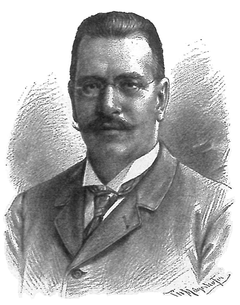- Milan Rešetar
-
Milan Rešetar 
Born February 1, 1860
DubrovnikDied January 14, 1942
Florence, ItalyOccupation linguistics, Ragusologist, historian Nationality Serb-Catholic Notable work(s) Čakavština i njene nekadašnje i sadašnje granice, Štokavski dijalekat, Najstariji dubrovački govor Milan Rešetar (February 1, 1860, Dubrovnik – January 14, 1942, Florence) was a Serb-Catholic, linguist, Ragusologist and historian.
After the gymnasium in Dubrovnik, he attained studies of classic Philology and Slavistics in Vienna. He worked as a high-school professor in Koper, Zadar and Split, and later a professor of Slavistics on universities of Vienna and Zagreb). He also edited the Croatian edition of "List drevnih zakona" magazine. Rešetar was a student of Vatroslav Jagić.[1] After retirement, he moved to Florence where he died 1942.
The main areas of his works included dialectology and accentology of South Slavic languages, as well as philologically impeccable editions of 15th to 18th century writers for the Yugoslav Academy of Sciences and Arts (renamed Croatian Academy of Sciences and Arts in 1991) edition "Stari pisci hrvatski"/Old Croatian Writers".
He was one of founders of South-Slavic dialectics, investigating features of Štokavian dialects (Der Štokawische Dialect, Vienna, 1907) and Čakavian dialects, and also wrote a monography about Molise Croatian dialect. He was also engaged in the field of numismatics (Dubrovačka numizmatika, 1924-1925), inheriting the interest and coin collection from his father Pavle.
His most important works include:
- "Čakavština i njene nekadašnje i sadašnje granice" (Čakavian Dialect, its Past and Present Boundaries)
- "Štokavski dijalekat" (Štokavian Dialect)
- "Najstariji dubrovački govor" (The Oldest Dialect of Dubrovnik)
- "Najstarija dubrovačka proza" (The Oldest Literature of Dubrovnik).
His works in this area are, with a few exceptions, superseded by later areal linguistics and historical dialectology research. On the other hand, Rešetar's editions of the Renaissance and Baroque poets and playwrights are still the standard printed issues; only modern computerized textology analyses, done in the Institute for Croatian language and linguistics, have begun to question some aspects of his transliteration choices on the graphemics level. The big part of his work in this area remains highly regarded and confirmed by contemporary textology.
On the other hand, some of his work has been questioned by some writers recently (e.g. where he claims that Čakavian dialect was never spoken in Dubrovnik). Second, his scientific attitudes towards the Ijekavian Štokavian dialect of Dubrovnik were driven by his own ethnic affiliation -- like many other prominent members of the intelligentsia in Dubrovnik of his time, Rešetar identified himself as a Serb Catholic. [1]
References
- M. Rešetar, Nikša Zvijezdić, dubrovački srpski kancelar XV. vijeka [Nikša Zvijezdić, A Serbian Chancellor in Dubrovnik in the 15th Century]. In: Glas - Srpska kraljevska akademija, 169 (1936)
- M. Rešetar, Die serbokroatischen Kolonien Süditaliens, Wien 1911 (Südslawische Dialektstudien; 5; Schriften der Balkankommission, Linguistische Abteilung; 9) (in Italian translatian with bibliography: Le colonie serbocroate nell’Italia meridionale, Campobasso 1997)
- M. Rešetar, Elementargrammatik der serbokroatischen Sprache, Berlin 1957 (Originally appeared as: Elementargrammatik der kroatischen Sprache/Elementargrammatik der serbischen Sprache, Zagreb 1916)
- M. Rešetar, Popis dubrovačkih vlasteoskijeh porodica, Godišnjak Dubrovačkog učenog društva "Sveti Vlaho", knj. 1, Dubrovnik, 1929
- M. Rešetar, Dubrovačka numizmatika, Belgrade 1924/25
- M. Rešetar, Der Štokavische Dialekt, Wien 1907 (Schriften der Balkankommission, Linguistische Abteilung; 4)
- M. Rešetar, Antologija dubrovačke lirike [Anthology of Dubrovnik Lyrics], Belgrade 1894
- M. Rešetar, Najstarija dubrovačka proza [The Oldest Dubrovnik Literature], Belgrade 1952 (Posebna izdanja : Odeljenje Literature i Jezika / Srpska Akademija Nauka; 192)
- Luko Zore, Dubrovčani su Srbi, Dubrovnik, 1903
- F. Miklosich, Monumenta serbica, Wien, 1858.
External links
- on Rešetar as a self-identified Serb Catholic
- "Vjesnik" newspaper article
- Article in magazin "Kolo"
- Tragom akribije Article in "Vijenac" about International scientific meeting about Milan Rešetar in Vienna and Dubrovnik
- Josip Lisac: "Milan Rešetar i njegovo doba", Kolo, 9, 1999, 3, 37–42.
Categories:- Dialectologists
- Serbian linguists
- Serbian historians
- Serbs of Croatia
- Serbian Roman Catholics
- People from Dubrovnik
- 1860 births
- 1942 deaths
Wikimedia Foundation. 2010.
